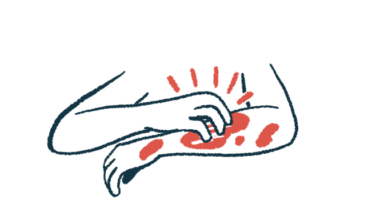Serlopitant May Reduce Itching in EB, But More Research Is Needed

The investigational oral treatment Serlopitant may be able to reduce itching in people with epidermolysis bullosa (EB), results from a small Phase 2 clinical trial suggest. However, most results did not achieve statistical significance, which means further studies will be needed to draw firm conclusions.
The results were published in the Journal of the American Academy of Dermatology, in a paper titled, “Phase 2 Trial of a Neurokinin-1 Receptor Antagonist for the Treatment of Chronic Itch in Epidermolysis Bullosa Patients: A Randomized Clinical Trial.”
Serlopitant, which is being developed by Menlo Therapeutics, is a small molecule that works by binding to neurokinin-1 receptor (NK1R), a protein receptor that helps to transmit “itch signals” from the skin to the brain.
Itching has been reported by EB patients as the most distressing symptom of their condition, ranking higher than pain or eating difficulties. Itching may create new wounds in these patients or exacerbate existing ones. But, to date, no randomized clinical trials have evaluated treatments for EB-related itching.
In this Phase 2 clinical trial (NCT02654483), researchers examined if serlopitant could reduce the itching sensation experienced by EB patients. It included 14 participants with moderate-to-severe itching, who were assigned randomly to treatment with either serlopitant (5 mg per day, taken orally) or a placebo for eight weeks.
This was followed by a four-week “washout” period to monitor for potential adverse reactions. Patients on placebo then were offered to participate in an open-label extension of the study, involving eight weeks of serlopitant plus four weeks of washout.
Participants’ itchiness was self-reported nightly on a scale of one to 10. After eight weeks of treatment, the average score in the serlopitant group was 0.64 points lower than that of the placebo group, but this did not reach statistical significance. That means it is mathematically impossible to confidently rule out the possibility that this difference occurred due to random chance, rather than because of the treatment.
Analyzing the data from a different angle, more people in the serlopitant group than the placebo group reported a reduction in itch score of at least one point (86% vs. 57%) or of at least three points (43% vs. 14%). But again, these differences were not statistically significant.
In subsequent analysis, the researchers noticed that, during the trial, one participant in the placebo group was independently diagnosed with seborrheic dermatitis (an itchy, rash-like condition) and was prescribed a cortisone-based lotion to help with this, which, the researchers presumed, likely resulted in that person reporting markedly decreased itch scores and skewing the results.
When this individual was removed from the analyses, a few statistically significant differences between the two groups were noted, the largest being an average reduction in itch score of two points in the serlopitant group after four weeks of treatment, as compared to no change in the placebo group.
There were no new safety concerns raised by this study. All participants reported at least one adverse side effect; all of those deemed likely to be related to the treatment were mild, and the most common was nausea.
“The promising results of this study suggest that the SP-NK1R pathway merits further evaluation as a potential target for this important patient population,” the researchers concluded. However, they acknowledged that, owing to the complications and lack of statistical significance, further studies will be needed before firm conclusions can be drawn. Indeed, a larger clinical trial (NCT03836001) testing the ability of this compound to reduce itching in EB is already underway and still recruiting participants.
Of note, Menlo Therapeutics did not fund the trial, but several co-authors of the study are employees of the company.






